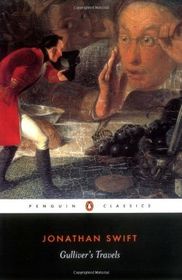Gulliver's Travels


Jonathan Swift's Gulliver's Travels is a masterpiece of English literature that has remained a favorite among readers for over three centuries. This novel is a satire on society and politics, and it presents a biting commentary on the human condition that is both thought-provoking and entertaining.
The novel tells the story of Lemuel Gulliver, a ship's surgeon who goes on four different journeys to imaginary lands. Each journey is unique and offers a glimpse into the absurdity of the world in which Gulliver lives. In the first voyage, Gulliver lands in Lilliput, a land inhabited by tiny people who are no more than six inches tall. Here, Swift satirizes the political landscape of his time by presenting a society where the difference in height is a measure of power and where trivial issues are given undue importance.
In the second voyage, Gulliver finds himself in Brobdingnag, a land inhabited by giants. Here, Swift turns the tables on the first voyage and satirizes the English society's tendency to be self-centered and arrogant. In Brobdingnag, Gulliver is the one who is small and insignificant, and he is treated accordingly by the giants.
In the third voyage, Gulliver travels to Laputa, a flying island inhabited by intellectuals who are so absorbed in their own thoughts that they are oblivious to the world around them. Here, Swift satirizes the pursuit of knowledge without practical application and the separation of academia from the rest of society.
In the final voyage, Gulliver lands in the land of the Houyhnhnms, a race of intelligent horses who have created a utopian society. Here, Swift satirizes human society's flaws by contrasting it with a society that is ruled by reason and logic rather than emotion and passion.
One of the most striking features of Gulliver's Travels is Swift's use of satire to convey his message. Satire is a literary technique that uses humor, irony, and exaggeration to expose and criticize human vices and follies. Swift's satire is biting, and it is aimed at various targets, including the political and social institutions of his time.
In addition to satire, Gulliver's Travels is also a work of imagination. Swift creates vivid and detailed imaginary lands that are a testament to his creativity and skill as a writer. His descriptions of the lands and their inhabitants are so vivid that they transport the reader to another world.
Another feature of the novel that stands out is its commentary on human nature. Swift's portrayal of human beings as flawed and imperfect creatures is both honest and unflinching. He exposes the greed, vanity, and pride that are the hallmarks of human behavior and shows how these flaws lead to conflict and suffering.
Finally, Gulliver's Travels is a novel that is still relevant today. Although it was written over three hundred years ago, its themes of politics, society, and human nature are still relevant today. It is a testament to Swift's skill as a writer that his work has stood the test of time and continues to be read and enjoyed by readers all over the world.
In conclusion, Gulliver's Travels is a masterpiece of English literature that is both entertaining and thought-provoking. It is a work of imagination and satire that offers a biting commentary on human nature and society. Swift's skill as a writer is evident in his vivid descriptions of imaginary lands and his unflinching portrayal of human flaws. Gulliver's Travels is a novel that has stood the test of time and continues to be relevant today.